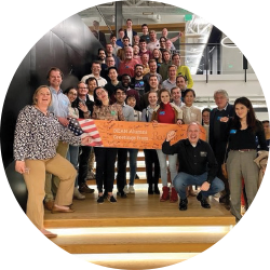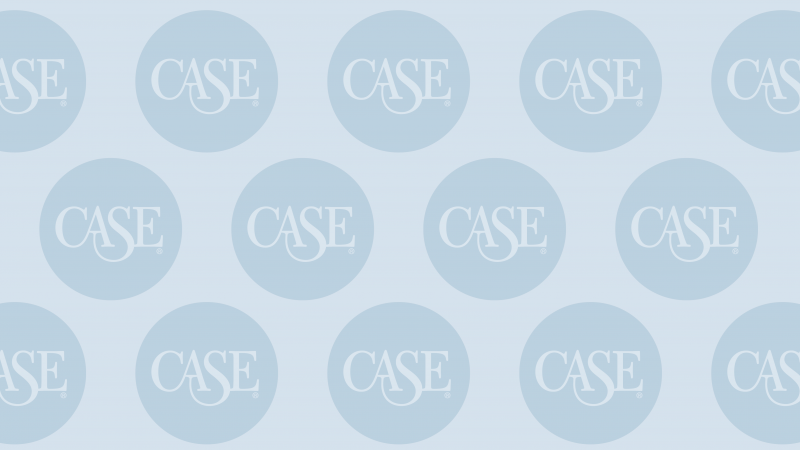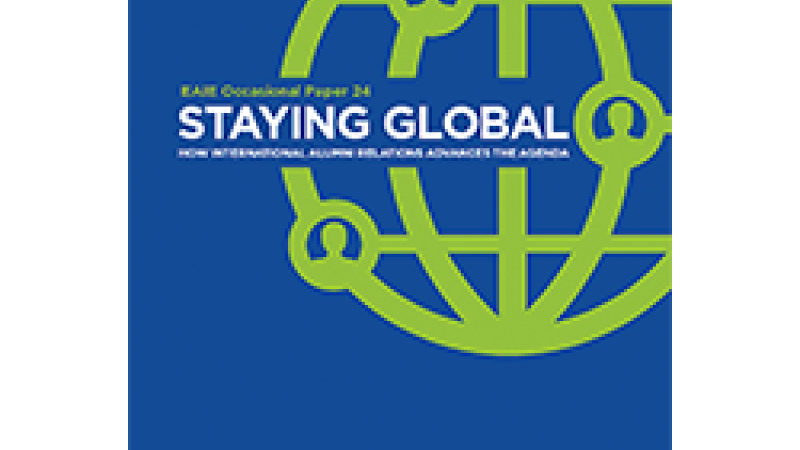
Creating a Global Network
When Mayke Oldenburg stepped into her new role in 2023 as Alumni Officer at Eindhoven University of Technology in the Netherlands, she did so with an abundance of excitement and a pinch of trepidation. This was not just her first foray into alumni relations but also her first stint in higher education. She came from the corporate world, where she had been a global account manager.
“I enjoyed what I was doing but I felt I was missing a sense of purpose or contributing to something bigger than sales figures,” she says.
The career move to Eindhoven allowed her to “keep the fun parts of my previous role, such as relationship management and interacting with people of different nationalities, and the management part of analytical thinking. But now I get to do that at an institution where I feel more connection to the mission,” she says.
As she settled into her new position and new profession, Oldenburg set out to learn as much as she could by using many of the usual means of getting acclimated to a new job. She relied on helpful coworkers, got familiar with campus and how the university operates, read up on the field of alumni relations, and attended the 2023 CASE Europe Annual Conference in Edinburgh, Scotland. Oldenburg also had a unique opportunity to jump-start this new chapter in her career. Through a well-established partnership, she was part of a ready-made network of seasoned alumni relations professionals at the three other technical universities in the Netherlands.
The 4TU.Alumni network, now in its 10th year, is an alliance of the four technical universities in the Netherlands that engages international alumni communities by pooling resources. In addition to Eindhoven (abbreviated TU/e), the University of Twente, Delft University of Technology, and Wageningen University & Research are members. Nearly one-third of alumni from these institutions live outside of the Netherlands. The network includes more than 30 alumni communities in Australia, Canada, France, Germany, the Nordics, Spain, Switzerland, Japan, and the U.S., and represents more than 250,000 alumni worldwide. It sponsors events and activities in cities across the globe that bring alumni of Dutch technical universities together to connect with each other and with their alma maters.
“It gave me a level of comfort to step into this well-oiled machine,” says Oldenburg. “It’s really helped me a lot. It’s just so smart to combine efforts in this way. We all have small teams, and for all of us, international alumni relations is just one part of our jobs. My counterparts at the other universities are experienced in the field, and they quickly became colleagues. [They were] ready to help me become part of the 4TU.Alumni network ... [and] they are very open. I could just pick up the phone with any questions I had related to my position.”
Oldenburg’s 4TU colleagues include:
- Anouk Dijkstal, Community Manager Alumni at TU Delft, the largest and oldest technical university in the Netherlands. With 12 years in the profession, she says she’s seen alumni relations come of age in the Netherlands. “It wasn’t in our culture, like it is in the U.S.,” she says. “The word ‘alumni’ was not even common 10 years ago. We’ve been doing a lot of learning ourselves and teaching our graduates that they are alumni [who are] part of our community and what that means.”
- Denise Spiekerman, Alumni Relations & Engagement at WUR. She’s been at the technical and agricultural university for 20 years in several positions. “I landed in the alumni relations position seven years ago, and I love every aspect of it—customer relations, volunteer management and stewardship, event planning, and communications,” she says.
- Joe Laufer, Senior Advisor, Alumni Relations at UT, the youngest and smallest of the technical universities. The lone American in the group, Laufer has three degrees from The University of Texas at Austin, U.S., (“the other UT,” as he likes to say). He also has a master’s degree from Twente, where he liked it so much, he stayed. “I was an active alumni volunteer in Texas and I’ve enjoyed bringing what I’ve learned in the U.S. to help grow Dutch alumni programs,” he says.

The network includes more than 30 alumni communities in Australia, Canada, France, Germany, the Nordics, Spain, Switzerland, Japan, and the U.S., and represents more than 250,000 alumni worldwide.
How It Began
Laufer and Dijkstal helped found the alumni network of three universities in 2014 under the acronym DEAN for Dutch Engineers Alumni Network. WUR joined the collaboration of technical universities in 2016. Very recently in 2024, the group undertook a rebranding to acknowledge alumni members’ wide-ranging disciplines beyond engineering, with the new name 4TU.Alumni.
4TU.Alumni formed under the 4TU.Federation through which the technical universities in the Netherlands combine efforts to address “challenges we are facing worldwide.” With that collaborative effort among the institutions already in place, the idea of forming the alumni network with those same institutions made sense.
“We would see one another through meetings of the general Dutch university alumni offices and we would talk about things we were doing, like what CRMs [customer relationship management systems] we were using,” says Laufer. “We were also talking about doing alumni events abroad.”
The group started with a tour of the United States, hosting “seven events in seven days, kind of like pop stars,” recalls Dijkstal with a laugh. “We started there because we have such a high concentration of alumni in America and because we knew that alumni engagement events were well-established there.”
During that week, DEAN held events in Seattle, San Francisco, Houston, Boston, and New York City.
“We each had to go to our institutional leadership to get approval and funding to take on such a big and untried endeavor,” says Laufer. “It was much easier to make the case as a network of three universities.”
“We felt we had a lot to prove that first time,” says Dijkstal. “Would alumni even want to come to the events? Would they be interested in meeting with alumni from other institutions?”
One of the group’s first decisions about how to frame the network has served them well and continues to be a key strategy.
“We were sure to allow each institution to retain its identity and branding on invitations and other marketing material under the umbrella of 4TU. It’s important that alumni can immediately identify their alma maters,” says Laufer.
That first multicity tour did prove successful, with upwards of 40 alumni attending each event.
“One of the best indicators [of success] for us was that at each event our guests were still there well after the end time. Some places had to throw us out,” says Laufer.

AMAZING LOCATIONS: 4TU.Alumni groups meet at technology, government, and business hubs around the world. Here, alumni members landed at NASA's Johnson Space Center where they toured the Neutral Buoyancy Laboratory.
Professional Ties Across the Globe
Today, 4TU.Alumni has an extensive international presence. The group strategically decides where to go and with what frequency based on where the largest groups of alumni are located. It visits the United States every year, with New York and San Francisco always on the itinerary. London, Paris, and Berlin are also yearly-visit cities. The network keeps in touch with its members through social media, and the alumni in each city and region keep in touch with each other through LinkedIn groups. In some places, the networks are so well-established that alumni volunteers take the lead on hosting 4TU.Alumni events throughout the year, in addition to the larger events directly coordinated by Laufer, Dijkstal, Spiekerman, and Oldenburg.
In most instances, 4TU.Alumni events are hosted at organizations at which one or more alumni are employed. These include Meta’s virtual reality lab in Seattle; the Johnson Space Center in Houston; the United Nations in New York; the World Bank in Washington, D.C.; the Advanced Semiconductor Materials Lithography Lab in Silicon Valley, California; the European Organization for Nuclear Research (CERN) in Geneva, Switzerland; and UNICEF’s Global Supply & Logistics Hub in Copenhagen, Denmark.
Alumni with smaller startups have also hosted the group, as have embassies and consulates. Often a Dutch ambassador in the host country will attend an event. The events most often feature a keynote speaker, tours, and lots of time for “borrels” (a Dutch expression for networking with food and cocktails).
In March 2024, more than 100 4TU alumni attended the first event of the network’s 10th anniversary year at the Embassy of the Netherlands in Paris. Laufer reflected on the growth of the network during the decade, calling it “one of the largest technical networks of its kind in the world.” The gathering coincided with the “Hello Tomorrow” Global Summit, which 4TU alumni startup entrepreneurs attended. The summit focuses on innovations in deep technology that impact human and planetary health.
The embassy’s Innovation Advisors, Joanette Polo and Esther Hogenhout, spoke about the Dutch Innovation Pact signed in 2023, which focuses on developing new synergies between the Netherlands and France in the areas of digitalization, key technologies, and industrial sustainability. A panel of alumni representing each of the 4TU universities shared details about their career paths, current work, and ambitions for the future of deep-tech sectors related to quantum computing, precision (genetics) medicine, cultivated meat, and space exploration.
The evening ended with the staple of 4TU events—a lively borrel that gave participants a chance to foster connections and expand their networks.
“The benefits to our respective universities are so profound—some measurable, some not,” says Spiekerman. “These alumni open doors to our students for internships and jobs and study abroad connections. On a recent U.S. trip when we visited the World Bank and the U.N., we met with HR staff. Now, 4TU has embedded programs at each of these organizations for students and new graduates seeking internships and jobs.”

BETTER TOGETHER: These four alumni engagement professionals join forces to run a successful international alumni relations program. From left: Joe Laufer, University of Twente; Mayke Oldenburg, Eindhoven University; Denise Spiekerman, Wageningen University & Research; and Anouk Dijkstal, Delft University of Technology.
Shared Experiences
Beyond the professional benefits, 4TU offers alumni avenues to connect over common personal experiences.
“4TU alumni who have built a life and career abroad have fascinating stories to tell,” says TU/e Applied Physics alumnus Martijn Mulders, Senior Research Physicist at CERN, who has helped to organize two 4TU events there. “It is very interesting to meet strangers with whom you have a certain history, interest, and culture in common.
“Also, it is a nice feeling to know that as an expat alumnus you have not been forgotten, that your old university is reaching out and connecting with you. At the most recent 4TU event at CERN, I was shocked to meet a 4TU alumnus who had lived nearby in Geneva for 25 years and had never visited CERN before! I thought that was pretty special. And the new Dutch Ambassador in Switzerland visited CERN for the first time that evening. I was surprised to learn that she also was a 4TU alumna who had a keen interest in physics and technology. So she could understand quite well what we are doing at CERN, and we had a really nice discussion.”
Stories like this from alumni abound as they consistently point to friendships and community building through 4TU.
And more broadly, adds Spiekerman, “each of our universities is committed to a global perspective. Through research and education, we all seek to tackle global issues. Our international alumni are valuable assets in doing this. They bring world views, expertise, and connections to help us achieve our mission related to addressing global challenges and being responsible global citizens.”
One other positive byproduct of the network for advancement professionals? They can share the workload.
“None of us has the luxury of full dedication [of time] to international alumni, so the division of labor is such a wonderful bonus in this collaboration,” says Dijkstal, who is credited by the group as “the great organizer.” She developed an evaluation report that documents the achievements and outcomes of each event—which her three 4TU colleagues happily use. Laufer excels at booking speakers, and Spiekerman takes the lead on travel arrangements. And now, a year in, Oldenburg says she is finding her place among the four.
“It’s been amazing to be part of this, to see the impact we are making,” she says. “The collaboration and sharing on so many levels are so rewarding. We help each other out, and in the end we all come out on top.”

Partnering Across Institutions
True to form, the 4TU.Alumni team members collaborated on these tips for those seeking to start their own alumni network across institutions.
- As a first step, partner with institutions that share your DNA—for us it’s the technical part. We started with that common ground. If the only common denominator were that we are all Dutch universities, our mission would be too broad, and the topics of the lectures would be broad—they wouldn’t be interesting enough to entice alumni to attend. Find that thing that ties your institutions together. It could be you are all in the same city or you are collaborating on a major research project. If you can’t explain why you are coming together, then it may be difficult to form an alliance.
- It helps to be on a similar level of maturity in your alumni relations program with budgets, communications, CRM systems, staffing, and number of alumni.
- Be highly organized. Every stage must be well planned out, with responsibilities clearly outlined. Lack of organization can translate to chaotic events, and alumni will notice that. They are much more likely to participate in well-planned, seamless events.
- Play to each person’s strengths and interests when dividing and assigning tasks.
- Remain flexible enough that each university has room to put its own brand and stamp on network events. While alumni enjoy being part of a bigger network, they also want a connection to and a feeling of pride in their own universities. This is especially important in fostering a culture of giving in these communities.
- Leverage your shared strengths. Identify concentrations of alumni at interesting companies, public organizations, or universities, where you may also find interesting venues for events. Remember to also tap into your country’s embassies and consulates as useful sources of local information as well as potential partners.
- Consider working first on a limited shared activity. Our offices hosted a few shared career café events for young alumni in the beginning. We all like each other and enjoy working together. If you are having fun, your alumni will feel that harmony.
About the author(s)
Ellen N. Woods is Writer/Editor at CASE.
Tags
Article appears in:

July - August 2024
Creating a Global Network: Dutch alumni teams extend their international reach. Also, meaningful donor and fundraiser relationships, meeting the mission at public regional universities, and connecting the pieces on a community college brand refresh.











